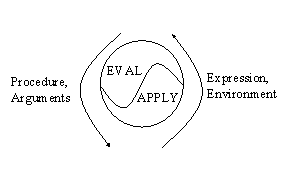
| 95.307 | 2001 |
7 Metalinguistic Abstraction |
Metacircular Evaluator
The Core of the Evaluator
Representing Expressions
The Environment
Running the Evaluator
Metacircular Code
| 7.1 Metacircular Evaluator |

No, Need to have somethings defined externally Usually called a BootStrap for the language i.e., somethings must be defined externally. List can be defined completely in terms of cons, car and cdr Smalltalk has a kernel written in C.
| 7.2 The Core of the Evaluator |
(define (eval exp env)
(cond ((self-evaluating? exp) exp)
((variable? exp) (lookup-variable-value exp env))
((quoted? exp) (text-of-quotation exp))
((assignment? exp) (eval-assignment exp env))
((definition? exp) (eval-definition exp env))
((if? exp) (eval-if exp env))
((lambda? exp) (make-procedure (lambda-parameters exp)
(lambda-body exp)
env))
((begin? exp) (eval-sequence (begin-actions exp) env))
((cond? exp) (eval (cond->if exp) env))
((application? exp) (apply (eval (operator exp) env)
(list-of-values (operands exp) env)))
(else
(error "Unknown expression type -- EVAL" exp))))
(define (apply procedure arguments)
(cond ((primitive-procedure? procedure)
(apply-primitive-procedure procedure arguments))
((compound-procedure? procedure)
(eval-sequence
(procedure-body procedure)
(extend-environment
(procedure-parameters procedure)
arguments
(procedure-environment procedure))))
(else
(error "Unknown procedure type -- APPLY" procedure))))
(define (list-of-values exps env)
(if (no-operands? exps)
'()
(cons (eval (first-operand exps) env)
(list-of-values (rest-operands exps) env))))
Used by apply to evaluate the sequence of expressions in a procedure body
(define (eval-sequence exps env)
(cond ((last-exp? exps) (eval (first-exp exps) env))
(else (eval (first-exp exps) env)
(eval-sequence (rest-exps exps) env))))
(define (eval-definition exp env)
(define-variable! (definition-variable
exp)
(eval (definition-value exp) env)
env)
'ok)
(define (eval-if exp env)
(if (true? (eval (if-predicate exp) env))
(eval (if-consequent exp) env)
(eval (if-alternative exp) env)))
| 7.3 Representing Expressions |
(define (self-evaluating? exp)
(cond ((number? exp) true)
((string? exp)
true)
(else false)))
(define (quoted? exp)
(tagged-list? exp 'quote))
(define (text-of-quotation exp) (cadr exp))
(define (variable? exp) (symbol? exp))
(define (assignment? exp)
(tagged-list? exp 'set!))
(define (assignment-variable exp) (cadr exp))
(define (assignment-value exp) (caddr exp))
(define (definition? exp)
(tagged-list? exp 'define))
(define (definition-variable exp)
(if (symbol? (cadr exp))
(cadr exp)
(caadr exp)))
(define (definition-value exp)
(if (symbol? (cadr exp))
(caddr exp)
(make-lambda (cdadr exp)
(cddr exp))))
(define (lambda? exp) (tagged-list? exp 'lambda))
(define (lambda-parameters exp) (cadr exp))
(define (lambda-body exp) (cddr exp))
(define (make-lambda parameters body)
(cons 'lambda (cons parameters body)))
(define (if? exp) (tagged-list? exp 'if))
(define (if-predicate exp) (cadr exp))
(define (if-consequent exp) (caddr exp))
(define (if-alternative exp)
(if (not (null? (cdddr exp)))
(cadddr exp)
'false))
(define (make-if predicate consequent alternative)
(list 'if predicate consequent alternative))
(define (begin? exp) (tagged-list? exp 'begin))
(define (begin-actions exp) (cdr exp))
(define (last-exp? seq) (null? (cdr seq)))
(define (first-exp seq) (car seq))
(define
(rest-exps seq) (cdr seq))
(define (sequence->exp seq)
(cond ((null? seq) seq)
((last-exp? seq)
(first-exp seq))
(else (make-begin
seq))))
(define (make-begin seq) (cons 'begin seq))
(define (application? exp) (pair? exp))
(define (operator exp) (car exp))
(define
(operands exp) (cdr exp))
(define (no-operands? ops) (null? ops))
(define (first-operand ops) (car ops))
(define (rest-operands ops) (cdr ops))
(define (cond? exp) (tagged-list? exp 'cond))
(define (cond-clauses exp) (cdr exp))
(define (cond-else-clause? clause)
(eq? (cond-predicate clause) 'else))
(define (cond-predicate clause) (car clause))
(define (cond-actions clause) (cdr clause))
(define (cond->if exp)
(expand-clauses (cond-clauses exp)))
(define (expand-clauses clauses)
(if (null? clauses)
'false
; no else clause
(let ((first (car clauses))
(rest (cdr clauses)))
(if (cond-else-clause?
first)
(if (null? rest)
(sequence->exp (cond-actions first))
(error "ELSE clause isn't last -- COND->IF"
clauses))
(make-if (cond-predicate first)
(sequence->exp (cond-actions first))
(expand-clauses rest))))))
| 7.4 The Environment |
(define (enclosing-environment env) (cdr env))
(define (first-frame env) (car env))
(define the-empty-environment '())
(define (make-frame variables values)
(cons variables values))
(define (frame-variables frame) (car frame))
(define (frame-values frame) (cdr frame))
(define (add-binding-to-frame! var val frame)
(set-car! frame (cons var (car frame)))
(set-cdr! frame (cons val (cdr frame))))
(define (set-variable-value! var val env)
(define (env-loop env)
(define (scan vars vals)
(cond ((null? vars)
(env-loop (enclosing-environment env)))
((eq? var (car vars))
(set-car! vals val))
(else (scan (cdr vars) (cdr vals)))))
(if (eq? env the-empty-environment)
(error "Unbound variable -- SET!" var)
(let ((frame (first-frame env)))
(scan (frame-variables frame)
(frame-values frame)))))
(env-loop env))(define (define-variable! var val env)
(let ((frame (first-frame env)))
(define (scan vars vals)
(cond ((null? vars)
(add-binding-to-frame! var val frame))
((eq? var (car vars))
(set-car! vals val))
(else (scan (cdr vars) (cdr vals)))))
(scan (frame-variables frame)
(frame-values frame))))
(define (lookup-variable-value var env)
(define (env-loop env)
(define (scan vars vals)
(cond ((null? vars)
(env-loop (enclosing-environment env)))
((eq? var (car vars))
(car vals))
(else (scan (cdr vars) (cdr vals)))))
(if (eq? env the-empty-environment)
(error "Unbound
variable" var)
(let ((frame (first-frame
env)))
(scan
(frame-variables frame)
(frame-values frame)))))
(env-loop
env))
(define (extend-environment vars vals base-env)
(if (= (length vars) (length vals))
(cons (make-frame vars vals)
base-env)
(if (<
(length vars) (length vals))
(error "Too
many arguments supplied" vars vals)
(error "Too few
arguments supplied" vars vals))))
| 7.5 Running the Evaluator |
(define (primitive-procedure? proc)
(tagged-list? proc 'primitive))
(define (primitive-implementation proc) (cadr proc))
(define primitive-procedures
(list (list 'car car)
(list 'cdr cdr)
(list 'cons
cons)
(list 'null? null?)
;;
more primitives
))
(define (primitive-procedure-names)
(map car
primitive-procedures))
(define (primitive-procedure-objects)
(map (lambda (proc) (list 'primitive (cadr proc)))
primitive-procedures))
(define (apply-primitive-procedure proc args)
(apply-in-underlying-scheme
(primitive-implementation proc) args))
(define (user-print object)
(if (compound-procedure? object)
(display (list
'compound-procedure
(procedure-parameters object)
(procedure-body object)
'<procedure-env>))
(display object)))
(define (setup-environment)
(let ((initial-env
(extend-environment
(primitive-procedure-names)
(primitive-procedure-objects)
the-empty-environment)))
(define-variable! 'true true initial-env)
(define-variable! 'false false initial-env)
initial-env))
(define (driver-loop)
(prompt-for-input input-prompt)
(let ((input
(read)))
(let ((output (eval input
the-global-environment)))
(announce-output output-prompt)
(user-print output)))
(driver-loop))
(define the-global-environment (setup-environment))
(driver-loop)